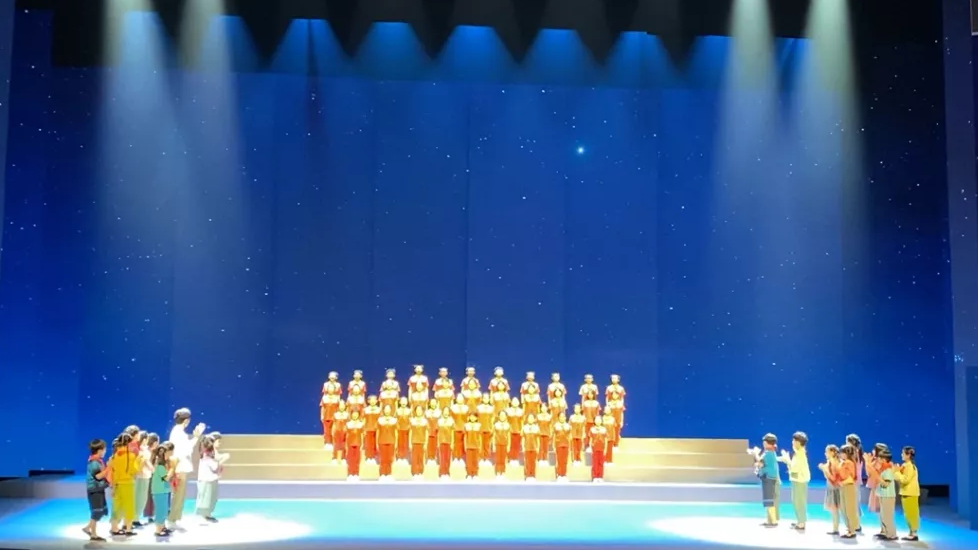
The left-behind children's choir at Qihang School, the first of its kind in central China's Hunan Province, rehearses in Changsha, capital city of Hunan Province, September 26, 2020. /Xinhua
The left-behind children's choir at Qihang School, the first of its kind in central China's Hunan Province, rehearses in Changsha, capital city of Hunan Province, September 26, 2020. /Xinhua
"Whenever I am a lost soul in darkness and fail to find the meaning of life, oh, the brightest star in the night sky, please beacon the path towards me." As the mellow yet powerful prelude to the song "The Brightest Star in the Night Sky" sounded and echoed at the National Theater for the Performing Arts in China on the evening of November 6, 42 children in red school uniforms, all swarthy and slight, started to sing, causing spectators' eyes to well with tears.
Staged on November 6 and 7, the musical "Ode to the Earth" became the latest hit at the grand theater. However, a choir mainly composed of left-behind children from central China's Hunan Province stole the show.
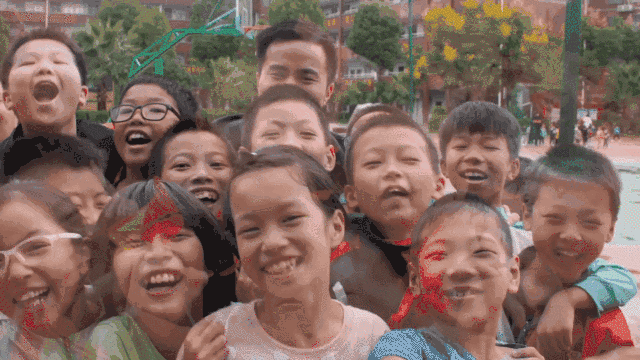
Chen Liangwei, founder of Qihang School, with his students. /Xinhua
Chen Liangwei, founder of Qihang School, with his students. /Xinhua
The young singers with mellifluous voices all come from Qihang School, a rural boarding school in poverty-stricken Qidong County, Hunan Province.
Established in 2016 by Chen Liangwei, once a successful entrepreneur, the school currently has over 1,500 students, nearly 90 percent of whom are left-behind children whose parents departed the village for cities in search of jobs to make a living.
After noticing the left-behind children on campus were generally introverted and quiet, Chen came up with an idea to bring them out of their shells through extracurricular activities, such as calligraphy, dancing and playing musical instruments. Each child was required to participate in at least one activity each semester.
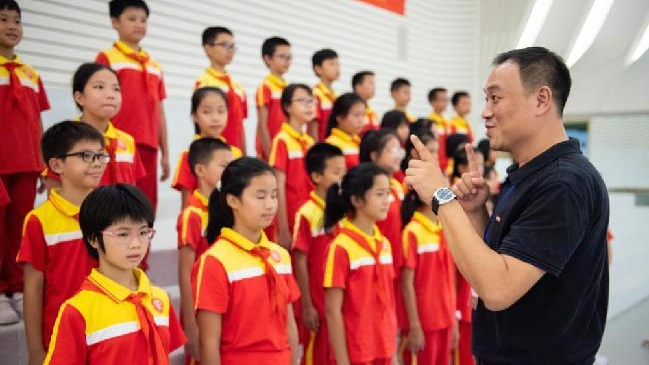
Wang Yulin (1st R), a music professor at Hunan University of Science and Technology in Xiangtan, Hunan Province, volunteere to direct the chorus at Qihang School, September 13, 2020. /Xinhua
Wang Yulin (1st R), a music professor at Hunan University of Science and Technology in Xiangtan, Hunan Province, volunteere to direct the chorus at Qihang School, September 13, 2020. /Xinhua
In April 2017, a year after the school was founded, singing in the choir became another option for children in third to sixth grade at Qihang School. Seeking a more professional level of vocal training, Chen invited Wang Yulin, a music professor at Hunan University of Science and Technology, to direct the chorus.
What set the chorus apart from others were the selection criteria for members, which focused on neither the child's appearance nor singing talent, but on children who were withdrawn or rebellious as well as those from needy families. In this way, the first left-behind children's choir in Hunan Province was formed.
Recalling the first vocal music class for the choir on April 13, 2017, Wang still remembers the awkwardness after his very first greetings to the students there were met with complete silence. Some children stared blankly at him, while some curled up, lowering their heads.
After a year spent with the kids, the scenario was nothing like Chen had expected. "Just take your time. Nothing could be more significant than transforming the kids who didn't dare to speak," said the headmaster. Wang consulted a few educational psychologists and vocal music guides specializing in children's chorus, while referring to abundant research on left-behind children.
For the past three years, in order to teach the children to sing every week, a 10-hour round trip covering over 400 kilometers between Qidong County in Hunan's Hengyang City and Xiangtan City has become Wang's weekly routine.
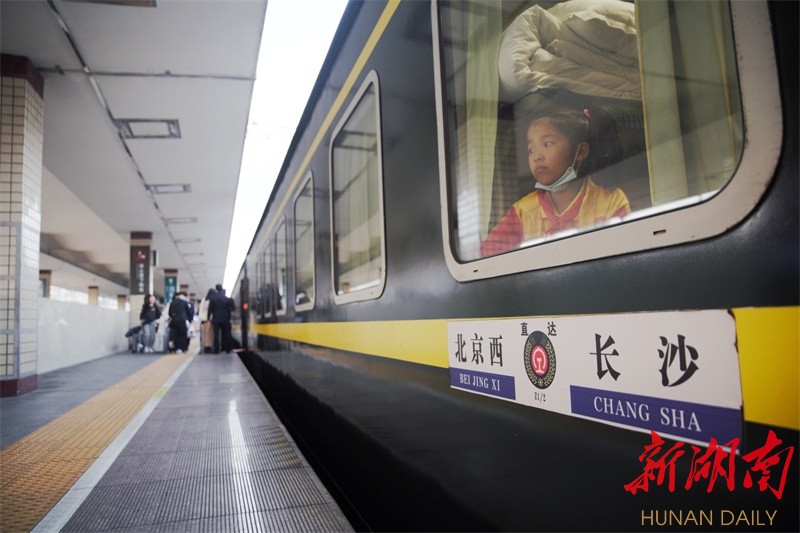
Xiao Yaoyao, a member of the left-behind children's chorus, looks through the window before the train heading for Beijing departs, November 4, 2020. /Hunan Daily
Xiao Yaoyao, a member of the left-behind children's chorus, looks through the window before the train heading for Beijing departs, November 4, 2020. /Hunan Daily
The endeavors made by the duo paid off. Time has witnessed the change of the once isolated children in the chorus. Not only have they grown fond of singing, but also become more outgoing and joyful in their daily lives. In addition, the young singers have been invited to perform on behalf of their left-behind peers at more events, at the provincial or national level, ever since.
"At the very beginning of setting up the chorus, we never expected the children would come this far with the achievement," Chen was quoted as saying by China Daily, adding that he felt very proud of the students.
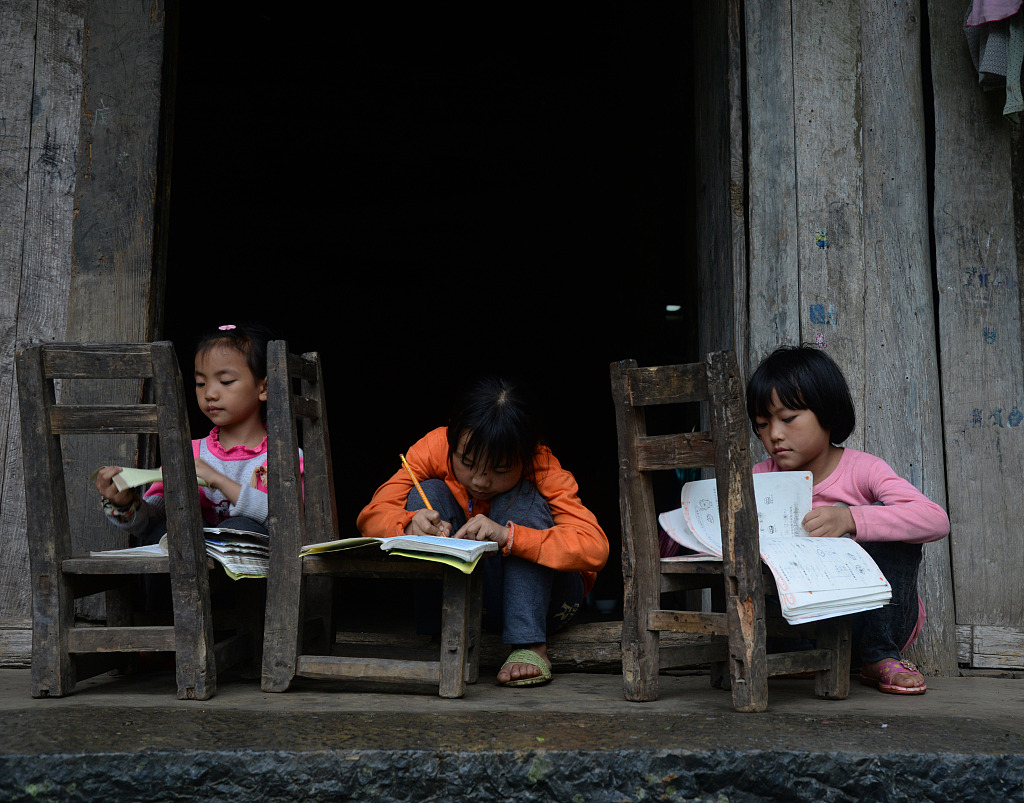
Left-behind kids do their homework in a doorway after school in Hechi City, south China's Guangxi Zhuang Autonomous Region, June 15, 2016. /CFP
Left-behind kids do their homework in a doorway after school in Hechi City, south China's Guangxi Zhuang Autonomous Region, June 15, 2016. /CFP
According to the latest statistics from China's Ministry of Civil Affairs, by the end of August 2018, there were 6.97 million left-behind children in the country's rural areas, most of whom were the children of migrant workers. The total number had reportedly decreased by 22.7 percent compared with the one in 2016. In terms of geographic distribution, southwest China's Sichuan Province has the largest proportion, followed by Anhui, Hunan, Henan, Jiangxi and Hubei provinces.

